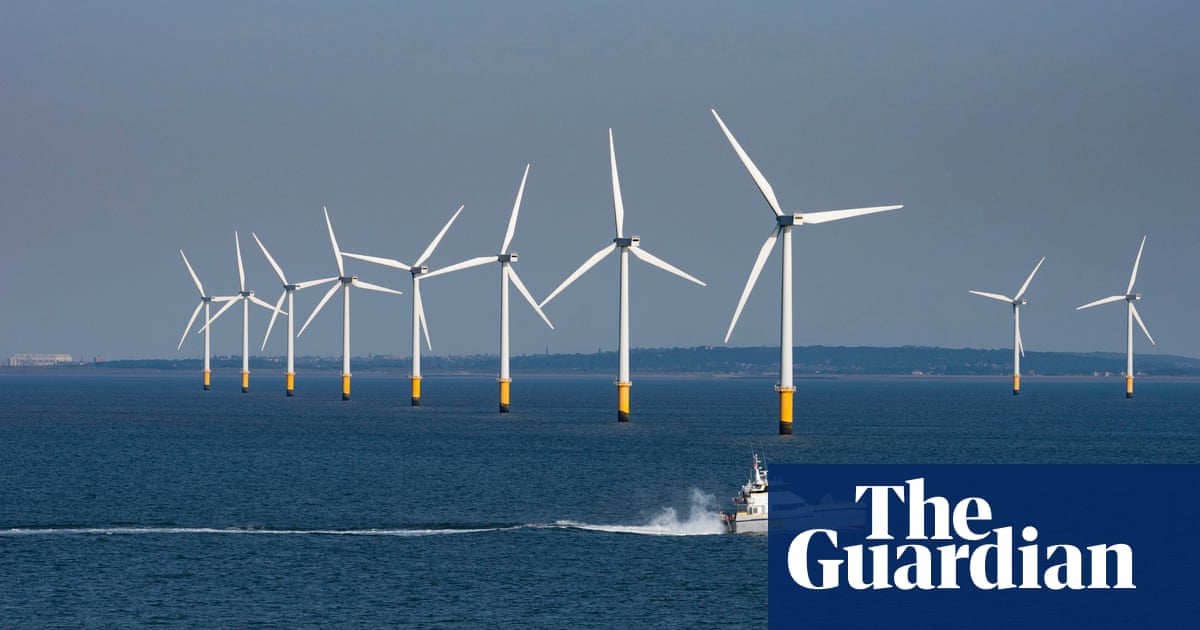The UKâs net zero economy grew by 9% in 2023, a report has revealed, in stark contrast to the 0.1% growth seen in the economy overall. Nevertheless, the report pointed out that strong future growth from green businesses was being put at risk by government policy reversals, lack of investment and competition from the EU and US.
Thousands of new green companies were founded in 2023 and overall the sector was responsible for the production of £74bn in goods and services and 765,000 jobs, according to the report by the Energy and Climate Intelligence Unit (ECIU) and the Confederation of British Industry (CBI).
Hotspots of net zero businesses and the well-paid jobs they provide occur across the country, rather than being concentrated in London and the south-east, the report found. It also highlighted strong net zero activity in some of the most deprived areas and in marginal constituencies that will be focal battlegrounds in the coming general election.
Achieving net zero emissions by 2050 is vital to limiting the damage from the climate crisis. Doing so would not only bring an economic boost but also cut energy costs for households and businesses and ensure energy security by ending the UKâs reliance on volatile fossil fuel markets, the report authors said.
Peter Chalkley, the director of ECIU, said: âAgainst the backdrop of economic stagnation, the net zero economy is bucking the trend, but itâs clear that the policy U-turns of the past year have damaged investor confidence at a time when the US and EU are investing billions to compete for clean industries. The question now is: will political parties provide the leadership, stability and investment needed to generate further growth â or shy away from the global race for net zero?â
Louise Hellem, chief economist at the CBI, said: âThe transition to net zero presents unprecedented opportunities for the UK to become a more resilient and productive economy while also tackling climate change. [Businesses] really donât want to see net zero issues politicised.â
Rishi Sunak, the Conservative prime minister, has weakened net zero policies including the rollout of electric vehicles and heat pumps and backed new oil and gas drilling, against the advice of scientists. The UK has also recently fallen down an index of attractiveness for renewable energy investment. Keir Starmer, the Labour leader, recently halved a pledge to invest £28bn a year in the green economy.
Adriana Curca, manager of CBI Economics, said: âWe quite often tend to think about the costs involved in the net zero transition, but there are a lot of economic opportunities, having a real potential to drive sustainable long-term growth.â
The new report analysed the green economy, including renewable energy, building energy efficiency, electric vehicles, carbon capture technology and green finance. It found net zero jobs were on average £10,000 better paid than the UK average of £35,400, and 50% more productive, generating £114,300 in economic activity overall. The number of net zero businesses rose by 4,000 to 23,745 in 2023.
The report found hotspots of net zero activity in some of the most deprived parts of the country, including Hartlepool, Nottingham, Redcar and Cleveland, all of which are in the 10% most deprived local authorities. It also found that half of the top 50 net zero hotspots in England and Wales were in the top 50 most marginal Conservative seats to be contested at the general election, including High Peak, Cheadle, Derby North, and Lancaster and Wyre.
Adriana Curca: âThese [net zero] jobs go a long way towards improving living standards in those areas.â
Thomas Farquhar at cleantech business Heatio said: âThe UK net zero economy offers huge opportunities for new, innovative businesses to grow. Frustratingly, we are lagging behind the rest of Europe.â
Farquhar said only 1% of UK homes had transitioned to low carbon dioxide heating, compared with 66% in Norway; and only 5% of suitable UK homes had installed solar panels, compared with 16% in the Netherlands.
The UKâs National Infrastructure Commission said on Friday that the âgovernment needs to move faster to ensure that the necessary [energy] infrastructure can be delivered over the next decadeâ. The International Monetary Fund said in December that the âeconomic benefits of accelerating the transition to a low carbon economy vastly outweigh its costâ.
A London School of Economics report published in January concluded that âtoo much current investment continues to be in the unsustainable economyâ, such as oil and gas and new homes and offices that are not energy-efficient.
It said: âThe UK needs to increase annual public investment by around 1% of GDP â £26bn at current prices â to make up for decades of underinvestment. There will be upfront investment costs, but targeted and temporary borrowing for good public net investment is fiscally responsible.â







